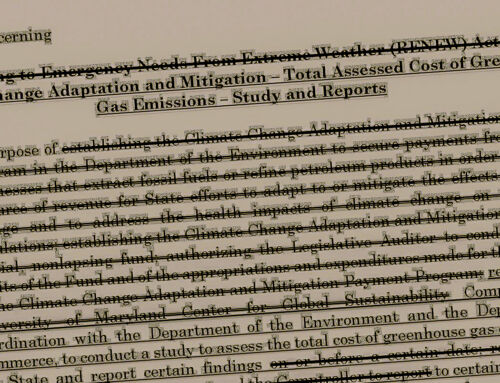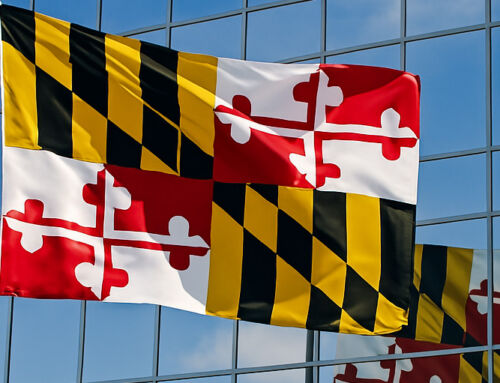View by Topic
Recent Articles
-
New Environmental Laws from the 2025 Maryland Legislative SessionSaturday, April 26th, 2025
-
Migratory Bird Treaty Act Does Not Prohibit Incidental Take – AgainSaturday, April 19th, 2025
-
President Trump’s Bold Step to Rein in State Overreach in Climate ChangeSaturday, April 12th, 2025
-
Mandatory GHG Disclosures in Maryland Real Estate ContractsSaturday, April 5th, 2025
View by Month/Year
“Green Building Law Update” Headlines
Recent Articles & News from
Stuart Kaplow’s blog
at GreenBuildingLawUpdate.com
- BEPS Redux: The Most Far Reaching Environmental Legislation of the 2025 Maryland General Assembly May 4, 2025
- New Environmental Laws from the 2025 Maryland General Assembly Session April 27, 2025
- Migratory Bird Treaty Act Does Not Prohibit Incidental Take – Again April 20, 2025
- President Trump’s Bold Step to Rein in State Overreach in Climate Change April 13, 2025
Subscribe to the Green Building Law Update!
Stuart Kaplow brings his expertise and extensive experience to the table with his unique digital publication, "Green Building Law Update". Subscribers receive regular updates to keep them informed about important issues surrounding Environmental Law, Green Building & Real Estate Law, as well as the emerging demand for Environmental Social Governance (ESG).
Get fresh content through the lense of Stuart Kaplow's cutting-edge expertise, innovative commentary and insider perspective. Don't miss another issue! Subscribe below.

The Evolution of Environmental Offsets: From Indulgences to Greenhouse Gas Emission Reductions
In the face of concerns over global climate change, finding effective solutions to reduce greenhouse gas emissions has become a pressing priority. Alongside direct mitigation efforts, environmental offsets have emerged as a critical tool in the battle against climate change. The concept of offsets, although modernized and adapted, is not new and can be traced back to an unlikely origin, the indulgences issued by the church during medieval times.
This blog post explores the importance of environmental offsets in a GHG emission reduction strategy, highlighting their historical roots and their significance in today’s environmentally conscious world.
The Historical Roots of Offsets
The notion of offsets finds its roots in the medieval practice of granting indulgences, which were certificates issued by the Catholic Church granting forgiveness for sins committed. This practice allowed individuals to offset their transgressions by performing specific acts or making monetary contributions. While indulgences were rooted in religious doctrine, their underlying principle bore a likeness to the economic idea of offsetting, which involves counterbalancing one’s negative impact with positive actions.
The Modern Environmental Offset
Fast forward to the present day, and the concept of environmental offsets has morphed into a contemporary and advanced meaning. Environmental offsets now refer to measurable actions taken to compensate for or neutralize the impact of certain negative activities in the natural environment, particularly in the instance of the removal of GHG emissions or increase in the storage of carbon, etc. The idea is to invest in activities or projects that reduce emissions elsewhere to balance out one’s own emissions. Additionally, purchasing and retiring offsets in the marketplace voluntarily or to satisfy a government mandate is key to reducing the emissions footprint.
The Importance of Environmental Offsets
- Addressing Global Carbon Imbalance: Environmental offsets play a crucial role in addressing the global carbon imbalance by allowing individuals, organizations, and governments to take responsibility for their emissions. Offsets help create a pathway toward achieving net zero emissions, which is essential for mitigating climate change and limiting global warming that often cannot be reasonably achieved by a single actor, for example, the owner of an existing high rise building or airline operating jets.
- Encouraging Sustainable Investment: Environmental offsets drive investment in renewable energy, energy efficiency, reforestation, carbon sequestration, and other sustainability initiatives. By financially supporting projects that reduce emissions or sequester carbon, offsets promote sustainability and contribute to a greener future.
- Fostering Innovation: Offsetting promotes the development of innovative technologies and engineered solutions aimed at reducing GHG emissions. The money available from offset programs encourages businesses and individuals to invest in cleaner and more efficient technologies, which can spur engineered advancements and drive the transition to a decarbonized economy.
- Enhancing Environmental Social Governance (ESG): Environmental offsets allow businesses to demonstrate their commitment to ESG driven sustainability and environmental stewardship. By voluntarily offsetting their emissions, companies can enhance their ESG credentials, build a positive brand image, and attract environmentally conscious stakeholders, all while repairing the planet.
- Alternative Compliance Paths: Offsets can ameliorate the harsh effects of mandatory environmental laws, like Maryland’s Climate Solutions Now Act of 2022 mandating GHG emission reductions under threat of Constitutionally questionable excessive fines, but which has exemptions and allows waivers, however, if it permitted offsets would result in greater efficacy of its GHG aims.
- Supporting Local Communities: Many offset projects have positive externalities and provide additional social and economic benefits to local communities. For example, composting has the potential to significantly reduce GHG emissions, especially when targeting food waste. Through carbon sequestration, diversion of organic waste from landfills, and soil improvement, composting offers a multifaceted approach to mitigating climate change as well as playing a role in reducing food insecurity.
The marketplace will ensure offsets represent real, permanent, and verified reductions, but given that GHG emissions are global in scope, regulations by one government body or another are likely nothing more than unduly burdensome and not constructive. But such is not to suggest that there may not be advantages of some offsets geographically in substantially the same place as the environmental harm.
Conclusion
Environmental offsets have come a long way since the issuance of indulgences by the medieval church. As we grapple with the 21st century need to reduce greenhouse gas emissions and combat climate change, offsets have emerged as an important strategy in our toolkit. By investing in projects that reduce emissions or sequester carbon, offsets enable individuals, businesses, and other organizations to take responsibility for their environmental impact. They foster sustainability, encourage innovation, enhance ESG, and support local communities.
Moving forward, a solution to the largest environmental issue of the day demands a holistic approach and a strategic vision of what can be achieved that combines direct emissions reductions with strategic offsets, including by way of example, food waste composting, which will be crucial for the ever increasing number of companies that believe profit should come not from creating the planet’s problems, but from solving them. Offsets are a market solution that will be key to doing better in creating a more sustainable and resilient future.
Webinar “You Need to Amend Your Lease Today in Advance of New GHG Laws” 30 talking points in 30 minutes, Tues, June 20 at 9 am ET presented by Stuart Kaplow and Hudes Nancy of ESG Legal Solutions, LLC. Webinar is complimentary, but you must register here.
Excited to be speaking at NAIOP DC MD Seat At The Table With Stuart Kaplow to talk about “what is really going on today in the commercial real estate market” in matters of ESG and specifically GHG emissions, on June 22nd at 11:30 am. You can register here.









